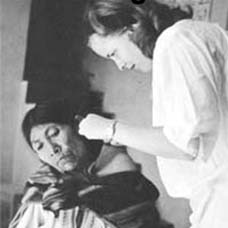
Itís early morning and Heather Senecal sips a cup of water while sitting on the porch of her hut in Togo
NSJHS alumna describes struggles of Third World
MICHAEL HOLTZMAN, Staff Writer
01/11/2005
NORTH SMITHFIELD -- Itís early morning and Heather Senecal sips a cup of water while sitting on the porch of her hut in Togo, West Africa. She watches troops of people parade in the heat to the cotton fields. One family might include the husband, his three wives, their 10 children, all traveling the same path six days a week.
Those children wonít be going to school to learn math or writing or to meet with her to learn about health and nutrition. Itís another day the Peace Corps volunteer wonít be able to try to break them from basic unsanitary health habits that could lead to the villagers becoming sick or dying.
Advertisement
By basic unsanitary habits, Senecal, 23, means not washing their hands after a trip to the bathroom, especially before eating. It means drinking dirty water during the rainy season, by which cholera claims innocent lives on a regular basis.
Senecal is telling all this to an economics class taught by Natalie OíBrien at the high school while at home for Christmas break. The students are studying world poverty, and the 1999 salutatorian of North Smithfield Junior-Senior High School has a first-hand account to tell.
"They accept thatís what happens," Senecal says of the villagersí response to the many cholera and typhoid deaths, when such diseases were wiped out from the civilized world. By "acceptable," she says after spending her first of two years in Togo, it means "they accept thatís always what has happened."
The idea of boiling dirty water to make it drinkable is "one more thing" for people too tired from long days in the field, says Senecal, who lives in a remote village with 400 people where thereís no electricity or running water.
She understands why parents are not available on Sundays to consider their childrenís educations and to help with homework, or to learn about bettering their own lives. Sunday Mass on their only day without work lasts five hours, until 2 in the afternoon, when itís so hot they sleep until supper time.
When picking their cotton cash crop through February, even the smallest child goes to the fields, missing weeks of school at a time.
"Thereís no choice," Senecal says. "Thatís what you do."
In an essential way, itís worse than that, too, says Senecal, who works with teachers within the eight villages and nine schools to raise funds for books and materials. (See related story at right.)
Where she went to high school, someone missing several weeks of school has options, she tells OíBrienís class: borrowing notes, obtaining work sheets or seeking help from teachers.
Itís different at the schools in Togo.
"When the blackboards get erased, the knowledge gets erased," she says.
There are no texts or workbooks. And students might include a 17-year-old in the fourth grade or a 12-year-old in seventh grade depending upon their abilities and availability to attend classes.
See TOGO --- Page A-6
Continued from Page A-5
While Senecalís role as a Peace Corps volunteer is to study the problems of Togo citizens and find solutions, the problems are a lot easier to identify than the answers.
Togo is a former German and French colony of 5.3 million people, a sovereign nation since 1960 between Nigeria and Ghana. Its capital, Lomé, is home to 750,000 people at the southern tip near the Gulf of Guinea. French is the official language, but there are some 45 Togolese dialects.
Keeping children out of school as child labor might be identified as a national problem.
"Education is important. But in the grand scheme of things, itís the crops -- whether cotton, yams or manioc (to make tapioca pudding) -- that supports the family for the next year," Senecal said. "So they have lots of kids." To ensure enough children are available also requires numerous births because the infant mortality rate is high. So is the number of women who die while giving birth.
"We lose a lot of women each year," Senecal said.
Senecal, just a year out of college where she focused on political science and womenís studies, faces another obstacle: "battling the ancestors." When she ominously says the word, you can almost feel their presence, like theyíre coming back to life in these villages "in the bush," as she describes them.
"Since I got to the villages, I found they do things the old ways -- and they wonít break it," Senecal says. "Over there, the philosophy is: ĎIf the ancestors didnít do it, weíre not doing it.í
"Itís frustrating," adds Senecal, but then smoothly shifts gears. She tells stories of how the villagers ask to marry her to one of their own; how sheís had several proposals in a culture where love and marriage are not connected. One man said heíd be a good husband -- and offered her four goats to say yes.
While Senecalís cell phone actually works "in the bush," the sounds and cheers from a radio broadcasting a big soccer match is about the only other thing to tell a visitor theyíre not living 100 or 200 years ago. She believes the villagers possess a keen, but different, intelligence.
"They can look at the sky and tell me down to five minutes when it will rain and for how long," she said.
And they always have the right amount of seeds to plant in their fields, and the last pinch of salt for their sauce is just what it needs for perfect flavor, she said.
Entertainment? Weddings and funerals, the latter a frequent "celebration" lasting several days, is a time of drumming and singing and lots of eating, Senecal said, "and itís a great way to meet people."
"Life is interesting as long as you keep an open mind," she said. Calling her time in Togo "a cool experience," sheís sure if she knew what she does now about Togo two years ago "I would still make the same decision."
When people come to her hut to visit -- sometimes at 4 in the morning -- if they eat, she has a rule she enforces: they must wash their hands with clean water and soap.
"I canít say Iíve had much success with that (in their own homes), but Iím still trying," says Senecal. "I still have another year."
©The Call 2005










